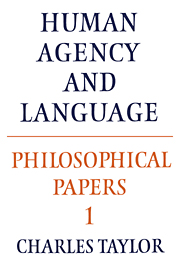10 - Theories of meaning
Published online by Cambridge University Press: 05 June 2012
Summary
How are we to approach the phenomenon of language, that people say things and others understand them? The fact that words and other signs have meaning can seem incredibly deep, enigmatic, difficult to understand. The sense of depth comes both from the realization that language is somehow essential to human life, that is, to whatever we unreflectingly want to identify as essential to being human; and also from the very pervasiveness of meaning in our lives, the difficulty of getting the phenomena in focus. We are in a sense surrounded by meaning; in the words we exchange, in all the signs we deploy, in the art, music, literature we create and enjoy, in the very shape of the man-made environment most of us live in; and not least, in the internal speech we rarely cease addressing to ourselves silently, or to absent others.
The sense of depth can easily turn into a sense of mystery. But here something in us, or our modern culture, may resist. We can call it our commitment to reason, or to scientific thought. Language must be a phenomenon of nature just like all others. Perhaps it is a characteristic of only one species (and even this is supposedly challenged by work on chimps), but this does not make it any less a natural phenomenon. It should therefore be understandable in the same way. It should be open to investigation, and ultimately understood/explained by some theory. The problem is just to find the right one.
- Type
- Chapter
- Information
- Philosophical Papers , pp. 248 - 292Publisher: Cambridge University PressPrint publication year: 1985
- 46
- Cited by



